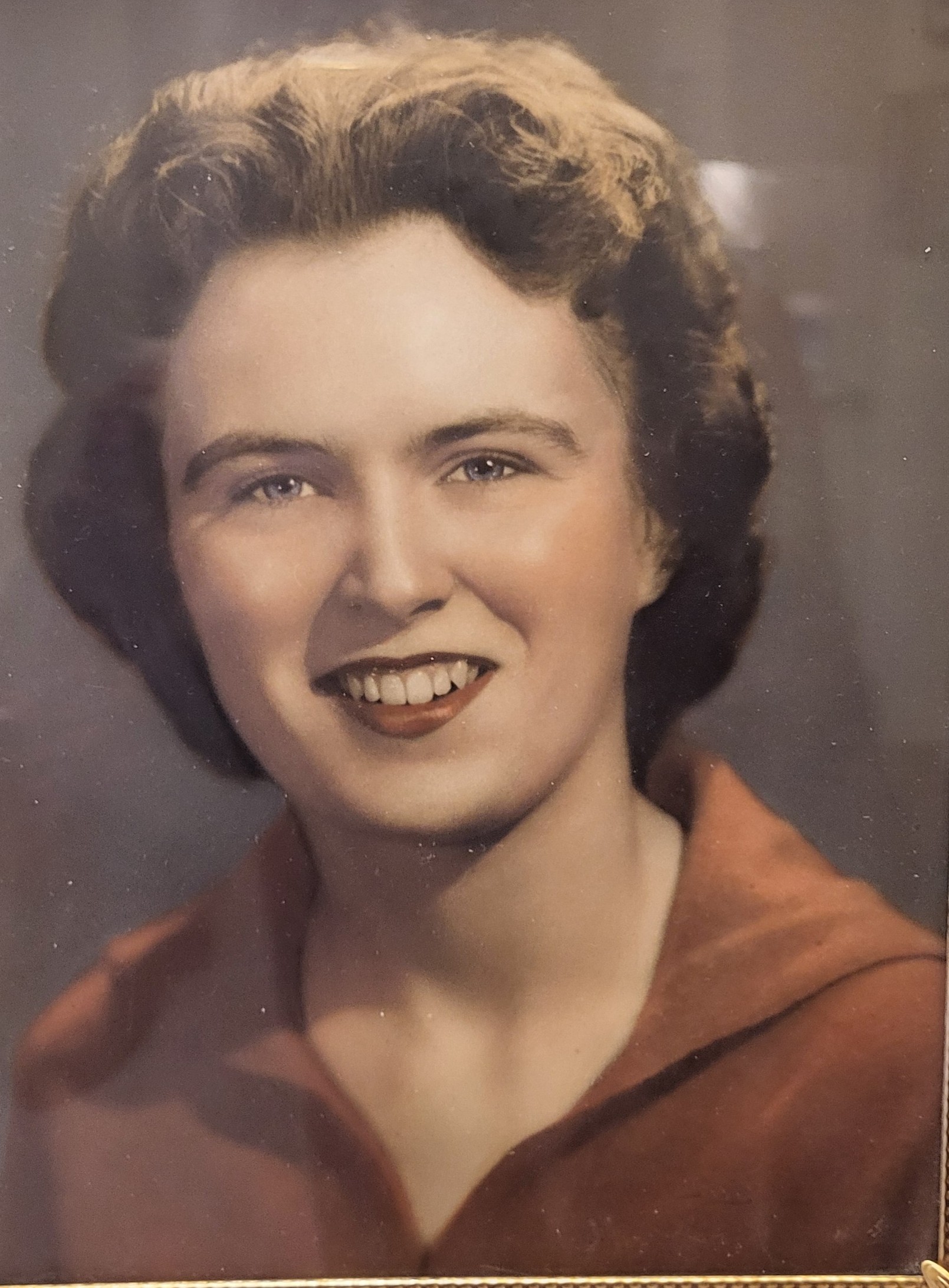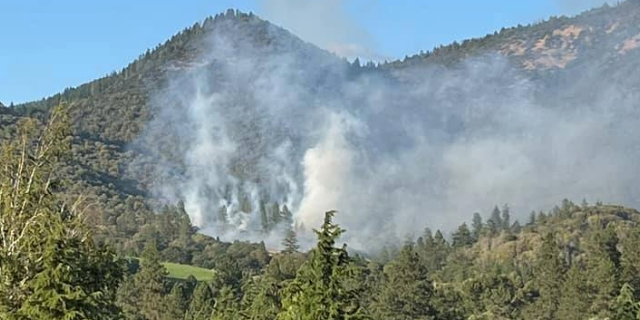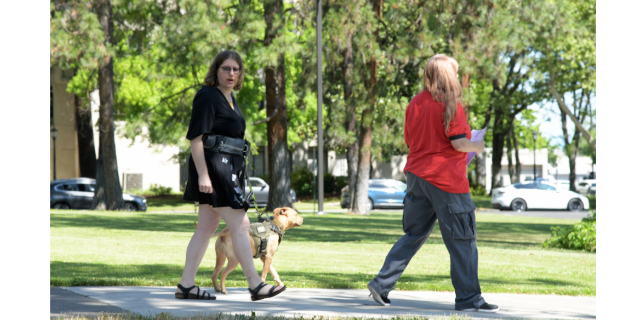A survivor’s story: Grants Pass woman escaped trafficking and now works to stop it
Published 6:00 am Saturday, April 15, 2023

- Oregon native Rebecca Bender shared her story as a survivor of human trafficking during two recent events in Enterprise.
ENTERPRISE — Don’t tell Rebecca Bender that human trafficking is just a big-city problem.
She knows better.
She’s lived it.
For six years, Bender, who grew up in Grants Pass, was manipulated and controlled by her trafficker. They met in Eugene, where he persuaded Bender, at the time a teenage mother with a young child, to start dancing for men. When he told her his job was taking him to Las Vegas, he got her to move with him. In Vegas, he forced her into prostitution. Physical abuse and drug addiction was part of the landscape.
Bender finally escaped from her trafficker for good in 2007. Today, she’s the founder of the Rebecca Bender Initiative, a nonprofit organization that aids fellow sex-trafficking survivors and helps law-enforcement agencies identify traffickers and rescue victims.
On Thursday, Bender led two presentations in Enterprise, “Not in Our Town: Changing Our Community’s Perception on Human Trafficking.”
Epiphany momentsBender’s escape from her trafficker wasn’t easy — and neither were the years that followed. She has vivid memories of two key moments that started her on the path of founding the Rebecca Bender Initiative.
She vividly recalls two specific moments that shaped her life after her escape. Both happened while she was sitting at a kitchen table.
No. 1: “I was still living back in Grants Pass, I got on government housing, I was on food stamps and working a minimum-wage job. And I just felt like, this isn’t freedom. How is this the freedom that everyone encourages you to run for? This feels still really stuck.”
But then came the moment of epiphany: “I can remember having this moment of thinking, ‘If I gave my traffickers six years, I can give this new life six years too.’”
It didn’t take six years. She went to community college, got a different job. “Things started to definitely turn around” in just a couple of years.
So, flash-forward to epiphany No. 2: Years later, Bender was sitting, again at a kitchen table, having a cup of coffee before sunrise.
“I’d gotten married, I had had my first baby with my husband and I woke up early — you know how moms and dads want that little bit of morning wake-up time before the kids.”
But as the sun started to rise, “I felt this sick-to-my-stomach feeling” — a flashback to the days when sunrise meant she would soon have to report back to the house where her trafficker would be waiting to collect the money she had made from the previous evening.
“And I had this epiphany of, how can I sit here and do nothing? How can I sit here in my nice comfy house with my warm cup of coffee, when I know what it’s like to be more afraid to go home, a place that’s supposed to be your safe haven? How can I be more afraid to go home than I was getting in and out of cars with strangers? And I thought, I can’t sit here and do nothing anymore.”
She started telling her story, at first anonymously. But the more she told her story, the more courage she gained — and the more she learned that the techniques her trafficker used to manipulate her are shockingly common.
Today, Bender is a published author and nationally recognized expert on trafficking. Her training materials have been used by more than 100,000 law-enforcement officials, medical professionals and community leaders. She’s also launched the Elevate Academy — a school fur survivors of human trafficking where students learn the skills necessary to build a new life. The academy has served nearly 1,000 students in 12 countries.
Rural traffickingThe type of trafficking that’s frequently depicted in movies, in which a trafficker sells a victim to a third party, isn’t particularly common in more rural areas, Bender said. Nor is the case typically that a victim is kidnapped, more or less at random, off the street.
Instead, officials in smaller towns often see evidence of what’s called “survival trafficking,” in which teenage runaways are exploited by older people who provide basic needs — food and shelter, for example — to vulnerable youths.
In addition, she said, small-town teens can be more vulnerable to a predator offering to whisk them away to a big city.
“We all want to find adventure, and when you’re a teenager, if you’ve got a free ticket to Phoenix or Scottsdale for spring break, it can feel really alluring.”
And, of course, Bender — who grew up in Southern Oregon — knows that savvy predators can take advantage of small-town hospitality.
“As small-town people, we tend to be more trusting than other places, right? We want to believe the best for our neighbors. We want to wave and bring over bread when someone moves in; we tend to be pretty trusting” — and police officers and social-service workers tend not to have much training in trafficking issues.
So, Bender said, “We’re going to talk to the community about signs to look for, with newcomers in town, predatory behavior per age group — whether it’s elementary, middle or high school. We’re going to get into a whole bunch of different ways to keep safe, not just from trafficking, but any type of exploitation and predatory behavior.”
Along the way, Bender said, the conversation may take a provocative turn:
She said Americans tend to think trafficking is an issue that primarily involves girls, but that ignores the demand side of the equation: “The reality is, the number-one buyer of sex in the world is American men. And so, how are we raising our sons to fuel the demand at this scale? … How do we help strengthen the character muscles in our young men?”
It’s all part of a broader discussion about protecting children, she said.
“We want to keep our kids safe. That’s the bottom line.”
Rebecca Bender will make two presentations in Enterprise on Thursday, April 13:
The first will be from 10 a.m.-2:30 p.m. at the Cloverleaf Hall, 600 NW First St., Enterprise, in a session intended primarily for professional and service providers. This training will present information on how to properly identify and respond to child victims of of trafficking and similar abuses.
Bender also will offer a community-awareness presentation of “Not in Wallowa County” for students (recommended for seventh through 12th grade) and adults to learn to recognize, intervene and prevent human trafficking. This community event will be held on Thursday, April 13 at Enterprise High School, 201 SE Fourth St.
This event will begin at 5 p.m. with a light dinner served in the cafeteria. At 5:30 p.m., parents can check in their children for child-friendly activities and supervision in the little gym during the event. The presentation will begin at 6 p.m. in the gymnasium.
Visit www.helpingheartschildadvocacycenter.org for more information on both events and to register.






